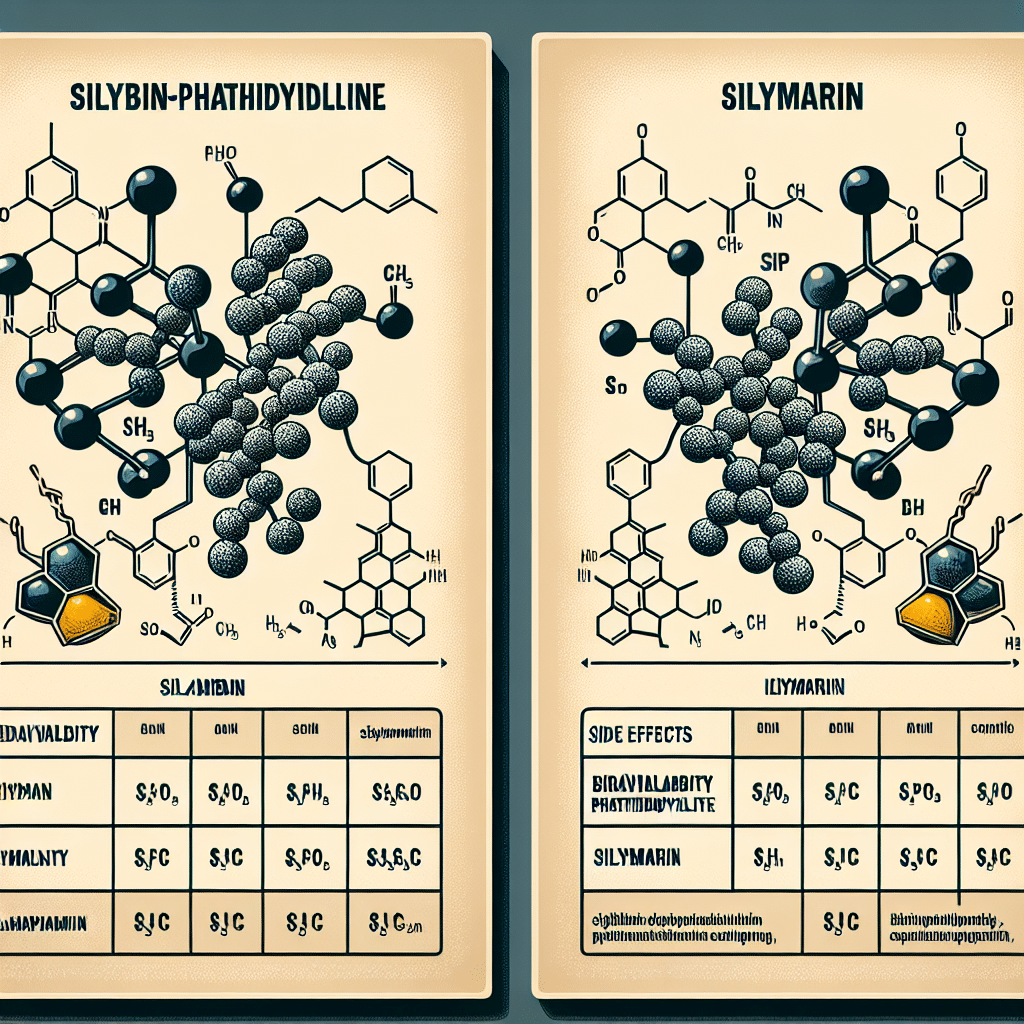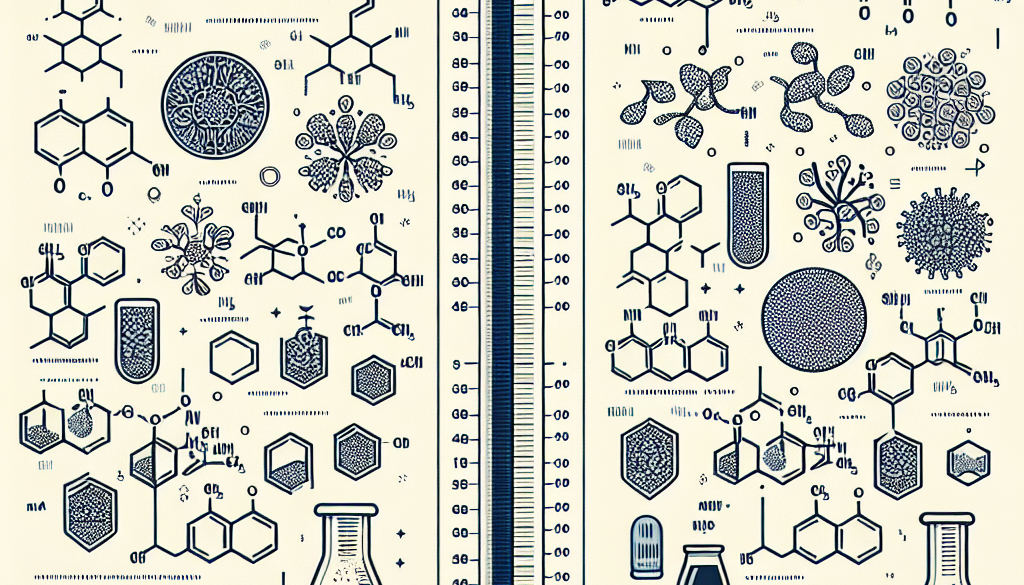Silybin-Phosphatidylcholine vs Silymarin: Comparison
-
Table of Contents
- Silybin-Phosphatidylcholine vs Silymarin: In-Depth Comparison
- Understanding Silybin and Silymarin
- Chemical Composition and Properties
- Silybin-Phosphatidylcholine Complex: Enhanced Bioavailability
- Efficacy in Liver Protection and Regeneration
- Applications Beyond Liver Health
- Case Studies and Clinical Trials
- Choosing Between Silybin-Phosphatidylcholine and Silymarin
- Conclusion: Key Takeaways
- Discover ETchem’s Protein Products
Silybin-Phosphatidylcholine vs Silymarin: In-Depth Comparison

Milk thistle, a plant with a long history of medicinal use, is primarily known for its liver-protecting compounds, silybin and silymarin. These substances have been the subject of extensive research due to their potential benefits in treating liver diseases and other health conditions. In this article, we will delve into the differences between silybin-phosphatidylcholine complex (also known as Siliphos) and silymarin, comparing their properties, bioavailability, efficacy, and applications.
Understanding Silybin and Silymarin
Silymarin is a flavonolignan complex extracted from the seeds of the milk thistle plant (Silybum marianum). It consists of several compounds, with silybin being the most active and abundant. Silybin itself is an antioxidant that has been shown to protect liver cells from toxins and promote their regeneration.
Chemical Composition and Properties
Before comparing silybin-phosphatidylcholine and silymarin, it’s essential to understand their chemical makeup and properties:
- Silybin: A flavonolignan and the primary active constituent of silymarin, known for its hepatoprotective effects.
- Silymarin: A complex mixture of flavonolignans, including silybin, isosilybin, silychristin, and silydianin, with silybin being the most potent.
- Phosphatidylcholine: A phospholipid that forms a significant part of cell membranes and can enhance the absorption of certain compounds when combined with them.
Silybin-Phosphatidylcholine Complex: Enhanced Bioavailability
The primary advantage of the silybin-phosphatidylcholine complex over standard silymarin is its enhanced bioavailability. Silybin on its own is poorly absorbed when ingested orally due to its low water solubility. However, when silybin is complexed with phosphatidylcholine, it forms a lipophilic molecule that can be more easily absorbed by the body, leading to higher plasma concentrations and greater therapeutic effects.
Efficacy in Liver Protection and Regeneration
Both silybin-phosphatidylcholine and silymarin have been studied for their liver-protective properties. Here’s how they compare:
- Silybin-Phosphatidylcholine: Due to its higher bioavailability, it has been shown to be more effective in clinical trials at protecting the liver from damage caused by toxins, alcohol, and drugs. It also promotes liver regeneration and has been used in the treatment of liver diseases such as cirrhosis and hepatitis.
- Silymarin: While also beneficial for liver health, silymarin’s lower bioavailability means that higher doses may be required to achieve the same level of efficacy as the silybin-phosphatidylcholine complex.
Applications Beyond Liver Health
Both compounds have been researched for applications beyond liver health, including:
- Antioxidant Effects: They both exhibit strong antioxidant properties, which can help combat oxidative stress and may reduce the risk of chronic diseases.
- Anti-inflammatory Properties: They have been shown to have anti-inflammatory effects, which can be beneficial in various inflammatory conditions.
- Cancer Research: Some studies suggest that they may have anti-cancer properties, although more research is needed in this area.
Case Studies and Clinical Trials
Several clinical trials have compared the effects of silybin-phosphatidylcholine and silymarin. For instance, a study published in the “World Journal of Hepatology” found that silybin-phosphatidylcholine was more effective than silymarin in improving liver function tests in patients with liver disease. Another study in the “Journal of Clinical Pharmacology” reported that the complex had significantly higher absorption compared to silymarin.
Choosing Between Silybin-Phosphatidylcholine and Silymarin
When deciding between the two, consider the following factors:
- Bioavailability: If higher bioavailability and a lower dosage are important, silybin-phosphatidylcholine may be the better choice.
- Cost: Silymarin is generally less expensive than the complex, which may be a deciding factor for some consumers.
- Purpose of Use: For general liver health maintenance, silymarin may suffice, but for more serious liver conditions, the silybin-phosphatidylcholine complex could be more beneficial.
Conclusion: Key Takeaways
In conclusion, both silybin-phosphatidylcholine and silymarin offer significant health benefits, particularly for liver health. The choice between them should be based on individual needs, desired outcomes, and cost considerations. Silybin-phosphatidylcholine’s enhanced bioavailability makes it a potent option for those requiring a more intensive therapeutic effect, while silymarin remains a reliable and cost-effective alternative for supporting liver function.
Discover ETchem’s Protein Products
If you’re interested in high-quality protein products, ETchem offers a range of collagen-based solutions. Their products are ideal for various applications, including nutraceuticals, pharmaceuticals, and food and beverage industries. With a commitment to quality and customer satisfaction, ETchem is your go-to source for premium protein products.
About ETChem:
ETChem, a reputable Chinese Collagen factory manufacturer and supplier, is renowned for producing, stocking, exporting, and delivering the highest quality collagens. They include marine collagen, fish collagen, bovine collagen, chicken collagen, type I collagen, type II collagen and type III collagen etc. Their offerings, characterized by a neutral taste, instant solubility attributes, cater to a diverse range of industries. They serve nutraceutical, pharmaceutical, cosmeceutical, veterinary, as well as food and beverage finished product distributors, traders, and manufacturers across Europe, USA, Canada, Australia, Thailand, Japan, Korea, Brazil, and Chile, among others.
ETChem specialization includes exporting and delivering tailor-made collagen powder and finished collagen nutritional supplements. Their extensive product range covers sectors like Food and Beverage, Sports Nutrition, Weight Management, Dietary Supplements, Health and Wellness Products, ensuring comprehensive solutions to meet all your protein needs.
As a trusted company by leading global food and beverage brands and Fortune 500 companies, ETChem reinforces China’s reputation in the global arena. For more information or to sample their products, please contact them and email karen(at)et-chem.com today.




